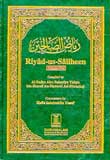Riyad Us-Saliheen (Gardens of the Righteous)

Chapter 213
The Excellence of Optional (Tawawih) Prayer during Ramadan
1187. Abu Hurairah (May Allah be pleased with him) reported: The Messenger of Allah (PBUH) said, "He who observes optional prayer (Tarawih prayers) throughout Ramadan, out of sincerity of Faith and in the hope of earning reward will have his past sins pardoned.''
[Al-Bukhari and Muslim].
1188. Abu Hurairah (May Allah be pleased with him) reported: The Messenger of Allah (PBUH) used to urge (the people) to perform (optional Tarawih) prayer at night during the month of Ramadan. He did not order them or make it obligatory on them. He (PBUH) said, "Whosoever performs (optional Tarawih) prayers at night during the month of Ramadan, with Faith and in the hope of receiving Allah's reward, will have his past sins forgiven.''
[Muslim].
Commentary: This Hadith highlights the following points:
1. Qiyam in the month of Ramadan is a much-stressed act and has great importance from the viewpoint of reward and award.
2. The sins which are pardoned through it are minor sins because major sins are not forgiven unless one makes sincere repentance and compensates those whom he has wronged.
3. That Qiyam during the month of Ramadan was the practice of the Prophet (PBUH). During the course of a Ramadan, he made Qiyam for three nights consecutively, that is, he performed this Nafl Salat in congregation with his Companions. On the fourth night, when his Companions gathered for this purpose he said to them, "I am afraid it will be made obligatory for you.'' So, in spite of their desire to join him in this prayer, he did not lead the Salat that night. How many Rak`ah did he perform in congregation in these three nights is a pertinent question here. According to Ahadith their total comes to eleven; eight Rak`ah and three Witr. Thus the Masnun number of Rak`ah of Qiyam Ramadan is eleven.
4. This Nafl Salat has been interpreted in Ahadith as Qiyam Ramadan. Later on they were named Tarawih. Tarawih is the plural of Tarwihah. Since the Companions of the Prophet (PBUH) and the successors to the Companions used to make a lengthy Qiyam in them and they would take rest after performing every four Rak`ah. This is how these came to be named Tarawih (Rest prayer). (Four Rak`ah are called Tarwihah).
5. Tarawih are in fact Tahajjud prayers. For the sake of convenience and benefit of the maximum number of people, it is performed in the month of Ramadan soon after `Isha' prayer, along with the latter, which is the early time for Tahajjud prayers.
6. That the Tarawih were performed in congregation is established from the conduct of the Prophet (PBUH). He led this Salat on 23rd, 25th and 27th of Ramadan. During his caliphate, `Umar (May Allah be pleased with him) started it again and ordered Ubayy bin K`ab and Tamim Ad-Dari to perform them in congregation. He enjoined them to perform eight Rak`ah Tarawih and three Rak`ah Witr. This practice has been going on ever since.
7. Some people say that performing Tarawih in congregation is a Bid`ah (innovation in religion) because it was introduced in the reign of `Umar (May Allah be pleased with him). But this is not correct because it is established that the Prophet (PBUH) did not continue it out of fear that it will be made obligatory; otherwise he would have carried on with it. When the fear that this practice be made obligatory was over, `Umar (May Allah be pleased with him) gave it the form of a Nafl prayer and revived the mode of performing it collectively, and thus fulfilled the desire of the Prophet (PBUH). In spite of all these facts, it is still permissible for one to perform Tarawih individually in the late hours of the night. Since ordinary people are not capable of performing it individually, the step taken by `Umar (May Allah be pleased with him) is perfectly correct. If this had not been done, the majority of the people will have remained deprived of the blessings and reward of Qiyam-ul-Lail, which would have been a great deprivation indeed.
8. Twenty Rak`ah Tarawih is not confirmed from any authentic Hadith, nor its ascription to `Umar i(May Allah be pleased with him)is proved from any reliable Muttasil (connected) Hadith. A claim has been made in a Munqati` (disconnected) narration that in the days of `Umar (May Allah be pleased with him) people used to perform twenty, thirty-six and forty Rak`ah of Tarawih out of which one can at best infer the justification for more than eight Rak`ah Nafl prayer. Even then the Masnun Tarawih will be eight Rak`ah only, and more or less than that will be Ghair-Masnun.
9. In Tarawih, that is Qiyam Ramadan, lengthy Qiyam is Masnun, but it must be borne in mind that the Qur'an must be recited according to the principles of `Ilm-ut-Tajwid with clear and distinct voice at a slow pace. Many of the Qurra recite so fast that it is hard for one to understand, let alone concentrate on what is being recited. Such recitation is a means of retribution rather than reward. A new system is now in vogue: According to this fashion, the whole Qur'an is finished within a few days and eight to ten parts of it are recited daily in Tarawih. There are hundreds of thousands people in the audience. After listening the Qur'an for a few days, these people console themselves that they have heard the entire Qur'an in Tarawih and are now free to pay full attention to their business to make the best of the `Eid season. They do not care to know whether the Qari is reciting the Qur'an or something else.
